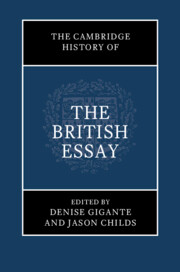Book contents
- The Cambridge History of the British Essay
- The Cambridge History of the British Essay
- Copyright page
- Contents
- Illustrations
- Contributors
- Acknowledgements
- Preface to a History in the Manner of an Essay
- Part I Forming the British Essay
- Part II The Great Age of the British Essay
- Part III Assaying Culture, Education, Reform
- Part IV Fractured Selves, Fragmented Worlds
- Part V The Essay and the Essayistic Today
- 39 The Eye and the I: Essay and Image
- 40 Of Human Suffering: The Essay and Ekphrasis
- 41 After Empire: Postcolonialism and the Essay
- 42 Performance and the Irish Essay
- 43 The Essay and the Public Intellectual
- 44 Essayism in Literary Theory
- 45 The Essay in the Career of the Contemporary British Novelist
- 46 Blogging in Britain: Essays in the Digital Age
- 47 The Essay, Ecocriticism, and the Anthropocene
- Book part
- Bibliography
- Index
43 - The Essay and the Public Intellectual
from Part V - The Essay and the Essayistic Today
Published online by Cambridge University Press: 31 October 2024
- The Cambridge History of the British Essay
- The Cambridge History of the British Essay
- Copyright page
- Contents
- Illustrations
- Contributors
- Acknowledgements
- Preface to a History in the Manner of an Essay
- Part I Forming the British Essay
- Part II The Great Age of the British Essay
- Part III Assaying Culture, Education, Reform
- Part IV Fractured Selves, Fragmented Worlds
- Part V The Essay and the Essayistic Today
- 39 The Eye and the I: Essay and Image
- 40 Of Human Suffering: The Essay and Ekphrasis
- 41 After Empire: Postcolonialism and the Essay
- 42 Performance and the Irish Essay
- 43 The Essay and the Public Intellectual
- 44 Essayism in Literary Theory
- 45 The Essay in the Career of the Contemporary British Novelist
- 46 Blogging in Britain: Essays in the Digital Age
- 47 The Essay, Ecocriticism, and the Anthropocene
- Book part
- Bibliography
- Index
Summary
This chapter explores how the essay, with its unlimited subject matter and the flexibility to address diverse audiences and ideas, provides public intellectuals with an invaluable and effective means of educating and challenging readers. It takes George Orwell as the model of the modern British public intellectual, someone whose interactive development as an intellectual and an essayist was fostered through numerous intellectual periodicals and magazines. It shows how four more recent essayists – Christopher Hitchens, Tony Judt, Tariq Ali, and Mary Beard – adapt the Orwellian approach as polemicist and outsider. In distinct ways, public intellectuals extend and enliven the contemporary public sphere, ensuring that the essay remains critical to the collective exchange of opinion.
Keywords
- Type
- Chapter
- Information
- The Cambridge History of the British Essay , pp. 650 - 664Publisher: Cambridge University PressPrint publication year: 2024

